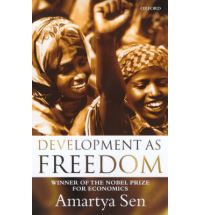International Development: Where to Start Reading
International development can be a daunting subject. It covers a range of issues including foreign aid, poverty reduction, gender equality, infrastructure, economics, human rights, and more. The distinction between international development and similar subjects such as international aid or disaster relief is its focus on long-term development. The primary concern of international development is to support countries as they develop the capacity to provide sustainable solutions to their problems, ultimately alleviating the need for support.
If you want to know more about international development, there’s a whole lot of reading out there.
Where to begin? Here's a short list to get you started.
 Development as Freedom, Amartya Sen
Development as Freedom, Amartya Sen
Sen is the winner of the 1988 Nobel Prize in Economics. His book Development as Freedom remains influential since it was published in 1999. Sen tells us that economics is not only concerned with generating income, but also making good use of that income to enhance our living and our freedoms. In Sen’s words, “To counter the problems that we face, we have to see individual freedom as social commitment. Development consists of the removal of unfreedoms that leave people with little choice and little opportunity of exercising their reasoned agency.”
An influential and controversial read since it was published in 2009. Zambian born Moyo argues that development assistance creates aid dependency and discourages governments from responding to the real needs of its people. She instead offers solutions to phase out government-to-government aid. Moyo is an economist who worked for the World Bank and Goldman Sachs. Time magazine named her one of the most influential people in the world in 2009.
 The Blue Sweater, Jacqueline Novogratz
The Blue Sweater, Jacqueline Novogratz
A personal memoir from Novogratz who left an international banking career to focus on ending global poverty. The title refers to Novogratz’s sweater that she gave to Goodwill when she outgrew it and eleven years later sees it on a boy in Rwanda, her name still on the inside tag. She saw it as a sign of the interconnection of all humanity. She tells stories about the people she met, the failures of traditional charity, and triumphs of investment philanthropy that can lead to self-sufficiency. This is a personal narrative that explains how one woman came to the idea for her foundation, Acumen, which supports entrepreneurs in developing countries.
 The White Man's Burden, William Easterly
The White Man's Burden, William Easterly
A strong critique of Western humanitarian aid programs and argument for paying attention to local details. Easterly, a New York University economics professor, dissects specific aid failures and successes. He argues that aid strategies must include accountability for failures so problems can be fixed and feedback from aid recipients so that problems can be identified. He provides clear examples to help readers understand poverty reduction strategies and question their effectiveness. Easterly isn’t shy in his critique and candidly argues that Western aid has been generous, but ineffective.
 The Fortune at the Bottom of the Pyramid, C.K. Prahalad
The Fortune at the Bottom of the Pyramid, C.K. Prahalad
An argument for revolutionizing business by entering emerging market in developing countries in a way that allows for both sides to benefit. Prahalad provides case studies from India, Peru, Mexico, Brazil, and Venezula that demonstrate success stories that both improved the business and reduced poverty. Bill Gates has said this book “offers an intriguing blueprint for how to fight poverty with profitability.”

